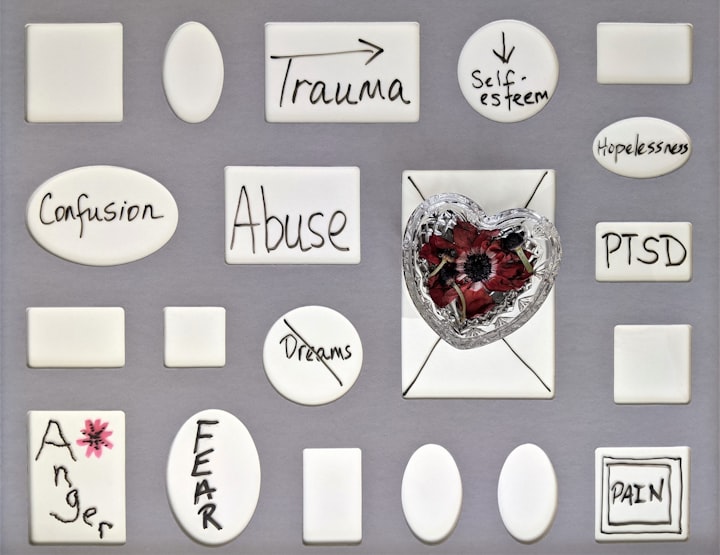Introduction To PTSD
intro to an illness that consumes many

Post-traumatic stress disorder or PTSD is a condition that results from a terrifying event, either witnessed or experienced firsthand. As it was thought only to affect people in the militaryit has in the past been called Combat Disorder. Symptoms can include anxiety, depression, nightmares, flashbacks and irrational or uncontrollable thoughts of the event. It is important to note that some people who go through a terrifying event may only have a temporary time with difficulties with coping. Through a support network and good self-care they may shake off the event. However if the symptoms worsen or do not get better and last months to even years, it is likely to develop into PTSD. PTSD in most cases affects a person’s day-to-day functioning. Here is a look at common behaviours associated with it.
Some people will develop intrusive or obsessive thoughts. These thoughts can be unwanted recurring thoughts of the traumatic event. Other thoughts may be reliving the event either through a dream or acting like the individual is in the time of the event. If it occurred in a child-the child may mimic the event through play. Nightmares are common as I mentioned and children will have trouble with bed wetting. If a scenario occurs where it is similar to the traumatic event, sufferers will show severe emotional stress and disturbing physical reactions as it reminds them of the traumatic incident.
Many people with PTSD will try to evade any conversation regarding the event. Some may become emotionally charged if a person suggests that they may be suffering. As such, many don’t seek help as avoidance behaviour is a sign of PTSD. Another thing that people tend to avoid are situations or people that remind sufferers of the event. For example, if the event was a car crash, they may stop driving altogether. Many people may become introverted and a huge red flag is when they start exhibiting a different behavioural pattern.
When it comes to negative behaviour, the person may as a form of coping use self-deprecation. Their thinking may become very negative and they often show a feeling that the future is hopeless. Sufferers often start having trouble with memory. Aspects of events not limited to the initial traumatic event may get blurred in their minds. Relationship difficulties may happen. They may start to detach from close friends and have trouble bonding with family members. Often things that offered pleasure cease to do that. They become withdrawn and go through something known as anhedonia-the inability to feel pleasure. This may be seen by their inability to show positive emotions.
The fact that the emotional response is hugely triggered in these individuals makes it very complex. Not only is the PTSD a mental illness but an endocrine one as well. The Sympathetic Nervous System is often in effect. Sometimes people refer to this phenomena as arousal response. Note that the Parasympathetic Nervous System is the rest and digest one while the former is the fight, flight, freeze, flee, faun or hyper focus one. Arousal symptoms include being easily frightened, always feeling on edge for danger, insomnia, difficulty concentrating, feelings of guilt and shame and self-destructive behaviour. The self-destructive behaviour can lead to drinking in excess, drugs or even risk taking.
PTSD symptoms will often vary in intensity from time to time. It is important to note that no case is a textbook case as PTSD is an empirical observation. Generally the PTSD is triggered when the person is stressed. For example they hear a loud popping sound. They may think it is a car engine backfiring or something they perceive to be threatening. Or there may be a news article that reminds the individual about their own incidents.
As this topic is very broad and affects so many people-many whom don’t realize it-I will visit this topic in future.
About the Creator
Sid Aaron Hirji
Canadian born man who finds literature and science equally fascinating. Trauma bleeds through generations, words heal the hidden scars.
youtube https://www.youtube.com/channel/UCS3WEyx5XeX-o8xRwG-cMlg
Reader insights
Outstanding
Excellent work. Looking forward to reading more!
Top insights
Compelling and original writing
Creative use of language & vocab
Easy to read and follow
Well-structured & engaging content
Excellent storytelling
Original narrative & well developed characters
Expert insights and opinions
Arguments were carefully researched and presented
Eye opening
Niche topic & fresh perspectives
Heartfelt and relatable
The story invoked strong personal emotions
Masterful proofreading
Zero grammar & spelling mistakes
On-point and relevant
Writing reflected the title & theme






Comments
There are no comments for this story
Be the first to respond and start the conversation.